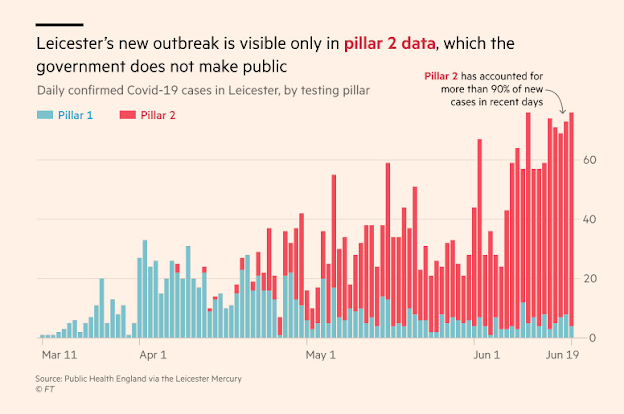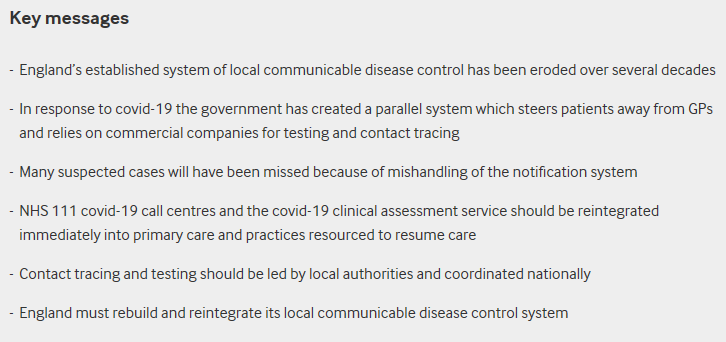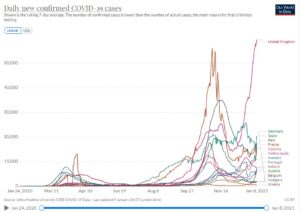The chaotic return to lockdown in Leicester is exposing the scandal of privatised ‘ test and trace’ failure that lies at the heart of the UK Government’s failure to manage the Covid-19 crisis.
In a report today, the Financial Times has exposed that the lack of warning about the rising tide of infections in Leicester can be blamed on the fact that the results of the privatised ‘Pillar 2’ testing of the wider population are not being shared openly and quickly with local health authorities.
The ‘Pillar 1’ tests being reported in Leicester – those carried out in hospitals on people with a clinical need and health workers – seemed to suggest there was nothing to worry about. The FT explains that the city was thought to have had just 80 new positive tests for the fortnight up to 26 June. But then Matt Hancock announced there had actually been 944!

Of course, the people of Leicester knew already that something wasn’t right. Five schools in the city had closed due to coronavirus outbreaks. There had been further outbreaks at food processing sites like McVities and Samworth Brothers and other factories where it appears physical distancing was not being properly followed.
But, scandalously, the data wasn’t there to prove it because still no proper “find, trace, test, isolate and support” system has been put in place – despite it being a necessity stressed by independent SAGE and other public health experts.
Hancock has also been forced to admit that, despite his Government’s attempts to assure parents that it is safe to drive all children back to school in September, the testing results indicate that school aged children have been infected and are likely to have transmitted the virus too.
Of course, this isn’t going to be just an issue in Leicester. The FT article also warns of similar peaks that are only being revealed through the ‘Pillar 2’ data in Yorkshire and the Humber and the East Midlands too.
But what the FT haven’t stressed is the reason for this failure – because the blame lies with the capitalist profiteering that they defend. However, that conclusion has been spelt out in a damning article in the British Medical Journal.
In the report, Peter Roderick, Alison Macfarlane and Allyson Pollock spell out firstly how cuts have reduced the number of public health laboratories from over 60 to just 9. Even these are now operated through Public Health England operating as an agency, separate from the NHS. That separation of testing and reporting from local NHS Services is a key part of the reason why, unlike countries that have successfully tackled the Covid pandemic, ‘test and trace’ is still not functioning properly.
Instead of using and developing existing public health facilities, the Government chose to award contracts for the ‘Pillar 2’ testing (through home testing kits and drive-in centres) to commercial companies, and not even to ones with a proven track-record. The same disastrous approach has also been followed for contact tracing.
The Report explains that:
- As far as can be worked out, testers at regional sites are provided by Sodexo and Boots; some sites are operated by Deloitte. Serco, G4S, and Levy provide facilities management. Randox provides home testing kits, the logistics for which are provided by Amazon;
- Pillar 2 samples are analysed by the four new “lighthouse labs,” which involve AstraZeneca and GlaxoSmithKline, even though both state that “diagnostic testing is not part of either company’s core business”;
- Randox analyses the samples from its home test kits, with a contract for £133m. This compares with the £86.9m provided to PHE for infectious disease, surveillance, and outbreak management in 2018-19. In all, 67,000 Randox tests are reported to have been sent to the US for analysis because of lack of capacity, but 29,500 results were found to be invalid and needed to be redone.
In the light of the news from Leicester, this conclusion is also particularly revealing:
- It is unclear what happens to many test results, in particular whether they are fed back to individual patients’ GPs. Several hundred thousand tests are reported not to have been linked to NHS records, missing confirmed cases. There is also no indication whether results are made available to staff doing local contract tracing. The chief medical officer for England is reported to have apologised to local authorities for not having detailed data from tests conducted by Deloitte. It is unclear whether PHE has timely access to test outcomes.
In short, the Leicester lockdown is exposing how privatisation, profiteering and the break-up of public services is to blame for the abysmal failure to address the Covid-19 epidemic.
To prevent more lives being lost, and more livelihoods disrupted, trade unionists and local communities have to demand that testing and tracing is taken out of the hands of these failed profiteers and publicly run, locally integrated and democratically managed through the NHS and Local Authorities – taking into account the urgent actions recommended in the BMJ report:





